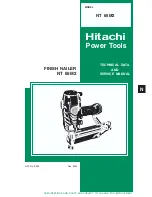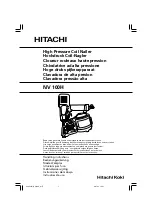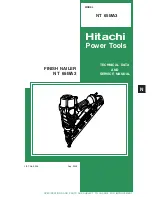
Guía de Diagnóstico de Averías
Deje de usar la clavadora inmediatamente si alguno de los siguientes problemas ocurre.
Podría ocasionarle heridas graves. Cualquier reparación o reemplazo de piezas los debe hacer
un técnico calificado personal de un centro autorizado de servicio.
!
ADVERTENCIA
Modelo IFN03000
Manual de Instrucciones
6-Sp
Problema
Causa
Solución
Debe reemplazar los anillos en O & chequear el fun-
cionamiento del elemento de funcionamiento al contacto
Debe apretar los tornillos
Debe reemplazar los anillos en O
Debe reemplazar la defensa
Debe apretar los tornillos
Debe reemplazar la defensa
Debe reemplazar la defensa
Debe limpiar el canal del sistema de impulso
Debe limpiar el cargador
Debe reemplazar el resorte
Chequée las conexiones, la manguera o el compresor
Debe reemplazar los anillos en O. Lubríquelos.
Debe reemplazar los anillos en O
Debe apretar los tornillos y las conexiones
Debe reemplazar el empaque
Necesita lubricar la clavador
Debe reemplazar el resorte
Debe reemplazar las partes internas dañadas
Debe reemplazar la guía
Debe usar los clavos recomendados para esta clavadora
Reemplácelos con clavos en buenas condiciones
Debe apretar los tornillos
Debe reemplazar el mecanismo de impulse de clavos
Vea las instrucciones de cómo cargar/descargar la
clavadora
Debe reemplazar los anillos en O o los sellos
Hay una fuga de aire en el
área de la válvula del gatillo
Hay una fuga de aire entre la
cubierta y la boquilla
Hay una fuga de aire entre la
cubierta y la tapa
La clavadora deja de clavar un
clavo
La clavadora funciona lenta-
mente o pierde su potencia
Hay clavos atascados en la
clavadora
Hay una fuga de aire en el
vástago de la válvula del gatillo
Los anillos en O de la cubierta de la válvula del
gatillo están dañados
Los tornillos de la cubierta están flojos
Los anillos en O están dañados
La defensa está dañada
Los tornillos están flojos
El empaque está dañado
La defensa está desgastada
La boquilla está sucia
La suciedad o daños evitan el desplazamiento
libre de los clavos o el mecanismo de impulso
en el cargador
El resorte del mecanismo de impulso está dañado
El flujo de aire hacia la clavadora es inadecuado
El anillo en O del pistón está desgastado o le
falta lubricación
Los anillos en O de la válvula del gatillo están
dañados
Hay fugas de aire
Hay una fuga en el empaque de la tapa
La clavadora no está bien lubricada
El resorte de la tapa del cilindro está roto
El orificio de salida de la tapa está obstruído
La guía del mecanismo de impulso está desgastada
Los clavos no son del tamaño adecuado.
Los clavos están doblados
Los tornillos del cargador o de la boquilla están flojos
El mecanismo de impulso está dañado
Los clavos están mal colocados
Los anillos en O o los sellos están dañados
2
General Safety Information
(Cont.)
sure must not exceed 120 psi. If the
regulator fails, the pressure deliv-
ered to the tool must not exceed 200
psi. The tool could explode which
will cause death or serious personal
injury.
G
Never use gasoline
or other flammable
liquids to clean the
tool. Never use the
tool in the presence
of flammable liquids
or gases. Vapors could ignite by a
spark and cause an explosion which
will result in death or serious per-
sonal injury.
G
Always remain in
a firmly balanced
position when
using or handling
the tool.
G
Do not remove,
tamper with, or
otherwise cause
the Work Contact
Element (WCE) or
trigger to become
inoperable. Do
not operate any tool which has been
modified in a like fashion. Death or
serious personal injury could result.
G
Do not touch the
trigger unless dri-
ving fasteners.
Never attach air
line to tool or
carry tool while
touching the trig-
ger. The tool could eject a fastener
which will result in death or serious
personal injury.
Warning indicates
a potentially
hazardous situation which, if not avoid-
ed, COULD result in death or
serious injury.
G
Always discon-
nect the tool
from the power
source when
unattended,
performing any
maintenance or repair, clearing a jam,
or moving the tool to a new location.
Always reconnect the air line BEFORE
loading any fasteners. Do not load
the tool with fasteners when either
the trigger is depressed or the Work
Contact Element (WCE) is engaged.
The tool could eject a fastener caus-
ing death or serious personal injury.
G
Always fit tool
with a fitting or
hose coupling
on or near the
tool in such a
manner that all
compressed air in the tool is dis-
charged at the time the fitting or
hose coupling is disconnected. Do not
use a check valve or any other fitting
which allows air to remain in the tool.
Death or serious personal injury could
occur.
G
Never place hands or
any other body parts in
the fastener discharge
area of the tool. The
tool might eject a fas-
tener and could result
in death or serious personal injury.
G
Never carry the
tool by the air
hose or pull the
hose to move the
tool or a compres-
sor. Keep hoses
!
WARNING
away from heat, oil and sharp edges.
Replace any hose that is damaged,
weak or worn. Personal injury or tool
damage could occur.
G
Always assume the tool contains fas-
teners. Respect the tool as a working
implement; no horseplay. Always
keep others at a safe distance from
the work area in case of accidental
discharge of fasteners. Do not point
the tool toward yourself or anyone
whether it contains fasteners or not.
Accidental triggering of the tool
could result in death or serious per-
sonal injury.
G
Do not drive a fas-
tener on top of
other fasteners.
The fastener could
glance and cause
death or a serious
puncture wound.
G
Do not operate
or allow any-
one else to
operate the
tool if any
warnings or
warning labels
are not legible. Warnings or warning
labels are located on the tool maga-
zine and body.
G
Do not drop or throw the tool.
Dropping or throwing the tool can
result in damage that will make the
tool unusable or unsafe. If the tool
has been dropped or thrown, exam-
ine the tool closely for bent, cracked
or broken parts and air leaks. STOP
and repair before using or serious
injury could occur.
Caution indicates
a potentially haz-
ardous situation which, if not avoided,
MAY result in minor or moderate injury.
!
CAUTION
Latch
Magazine
Work Contact
Element (WCE)
Nail Discharge Area
Trigger
Warning Labels
Nail Loading Area
Nailer Components And Specifications
Model IFN03000
Operating Instructions
• REQUIRES:
.80 SCFM with 10
nails per minute @ 90 psi
• AIR INLET:
1/4” NPT
• NAIL SIZE RANGE:
3/8” to 1-1/4”
• MAGAZINE CAPACITY:
100 Nails per load, 18 gauge
• WEIGHT:
2 lbs., 15 oz.
• LENGTH:
9”
• HEIGHT:
7-1/2”
• MAXIMUM PRESSURE:
100 psi
• PRESSURE RANGE:
60 - 100 psi
Cap Exhaust
CAMPBELL
CAMPBELL
PROFESSIONAL
PROFESSIONAL
HAUSFELD
HAUSFELD
O I L
!
WARNING
www.chpower.com
Quick Clear
Nose




























